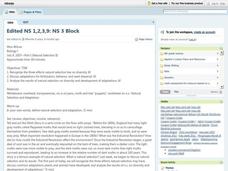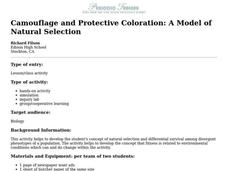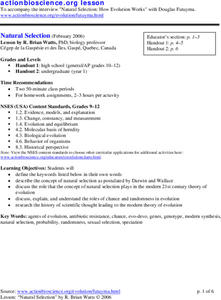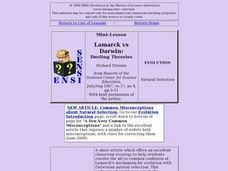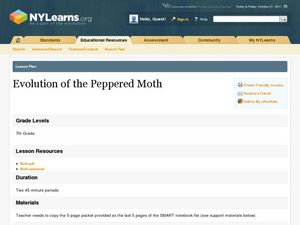Curated OER
Natural Selection
Students examine adaptation through a hands-on activity and determine how the gene pool can affect adaptability. They simulate a predator and prey relationship by going on a hunt for colored acetate disks. After a three minute hunt, they...
Curated OER
Natural Selection And Evolution
Students investigate the concept of evolution and how natural selection is used as an indicator that evolution has happened. They recognize the three effects it has on diversity and how adaptations can develop. Diversity is explained as...
Curated OER
Natural Selection I
Eighth graders list the steps of Darwin's natural selection. They demonstrate the process of natural selection in a predation activity. Students create paper origami frogs to race across the floor and analyze the differences in the...
Curated OER
Natural Selection And Evolution
Seventh graders investigate the concept of natural selection and its relationship to the theory of evolution. They conduct research using a variety of resources and use the information to create a class presentation and open up the...
Curated OER
Introduction To Natural Selection
Seventh graders investigate the concept of natural selection and it relation to the theory of evolution. They create a definition for classification based upon looking at other subjects that are similar. The variation of species is...
Curated OER
Genetics 4 Mutations
Students identify and illustrate how changes in DNA cause mutations and evaluate the significance of these changes. They illustrate a chromosomal mutation such as duplication, deletion, inversion, and translocation.
Curated OER
Wait, They Can do it by Themselves?
Students recognize the concepts of evolution and natural selection as well as cladistics and phylogenetics. They observe the process of regeneration in a sea anemone to simulate asexual reproduction.
Curated OER
How Does Evolution Work?
Students pretend they are a scientist like John Endler in this Web activity. They visit his pools, from hypotheses, and test them out. In the process, the explore about natural selection and sexual selection. They are able to explain the...
Curated OER
The Value of Behavioral Variation in Homo sapiens
Students look at the behavioral characteristics of their peers from a historical perspective, and realize that, in the larger scheme of a community, these behaviors do have some value, and that a society as complex as ours does need the...
Curated OER
Adaptation and Mimicry - Biology
Students compare and contrast adaptations involving camouflage, warning coloration, and mimicry. They explain the relationship between adaptation and ability for survival and reproduction. Students define Batesian and Mullerian mimicry...
Curated OER
Camouflage and Protective Coloration: A Model of Natural Selection
Students investigate natural selection and differential survival among divergent phenotypes of a population. Using everyday items , they model adaptations of camouflage and protective coloration in two very different environments.They...
Curated OER
Natural Selection
Students research examples of Natural Selection on a website provided by the teacher. They experiment in groups, different processes of Natural Selection and list them on a chart provided in this lesson plan
Curated OER
Sexual Selection in the Animal Kingdom
Students research how sexual selection plays a role in driving evolution. They experiment how variation exists within not just obvious physical traits, but metabolically and behaviorally. They write a letter describing a problem, and a...
Curated OER
Applied Evolution: How Will We Get There from Here?
Students explore the basic process of natural selection and how people can manipulate that process today. The consequences of natural selection on daily life and the implications of evolutionary biology in basic and applied science is...
Curated OER
Natural Selection
Students construct a working definition of the word "evolution," and list the key points of Darwin's theory of natural selection. They create paper moths to help them explain the importance of camouflage and how it relates to natural...
Curated OER
Natural Selection
Students use discussion questions, handout information and research topics to explore several issues related to natural selection and evolution. They examine Darwin's research on the finch and antibiotic resistance.
Curated OER
Lamarck vs Darwin: Dueling Theories
Students, in groups, study cheetah, blind cave organisms, and naked mole rats to explain facets of evolution.
Curated OER
The Natural Selection of Stick-Worms
Students discuss and role-play the elements of natural selection. They use toothpicks to represent Stick-Worms and discover the mechanisms of change of traits in populations.
Curated OER
Who Gets Eaten? A Study of Natural Selection
Fourth graders represent a new predator on a population of colored worms. They mathematically determine the effect of the new predator on the survival and reproductive rates of the worms, simulating natural selection at work.
Curated OER
Candy Dish Selection
Students explore natural selection. They explore the concepts of adaptations, and the way which random factors affect the survival of individuals and populations.
Curated OER
Introduction to Natural Selection
Students develop an understanding of natural selection, specifically, how it unfolds from generation to generation.
Curated OER
Evolution of the Peppered Moth
Seventh graders complete a timeline about the evolution of the peppered moth. In this biology lesson, 7th graders write an essay about how human can affect evolution. They share their essay with the class.
Curated OER
Natural Selection in Action
Students demonstrate natural selection through a lab activity. In this biology instructional activity, students explain how natural selection leads to speciation. They complete their lab report and discuss results in class.
Curated OER
Hide and Survive: A Natural Selection Activity
Students explore the theory of natural selection given certain scenarios. In this biology lesson, students graph data taken from the experiment. They explain the factors that contribute to the survival of the fittest.



